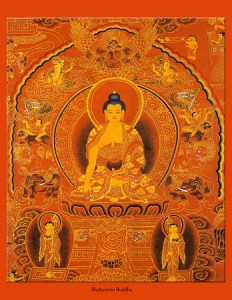
An excerpt from a teaching called the Eightfold Path by Jetsunma Ahkon Lhamo
Right mindfulness has to do with cognition. Everybody perceives. We all have perception. If you took any two people and asked them what their perception of a certain situation was, or even to describe a certain situation, it would be radically different. And it’s not that they remember differently, it’s that they saw differently. That’s the interesting thing. The cognitive process begins with the impact of phenomena and how it meets our habitual tendencies. It’s that meeting which is our perception. If we were able to perceive something, such as a person, without moving forward in cognition and having opinions, and concepts and ideas about that person, life would be beautiful. If we could just meet each other metaphysically naked and accept one another and let it go at that without hatred, greed or ignorance. Oh mani pedma hung. What a wonderful world that would be.
But that’s not our habit. Our habit is that when we see a person, we decide, “I don’t like what he’s wearing. That’s not my color. I don’t like that haircut. I don’t like him. I don’t like the way you wear your robes.” You know? We have all these opinions. And of course we keep them to ourselves and smile but it’s those opinions rattling around in our brains that are causing us so much trouble. We never stay with a mere impression and leave it wholesome. It never happens unless we are practicing right mindfulness. It takes a supreme effort to practice like that. We conceptualize. We write our own inner script for instance. We have an original perception and we react toward it. Reaction is the name of the game of the five senses. Whatever that reaction is we build a story about it. And then you have a whole house of conceptualization wrapped around that person. And it has nothing to do with them. But you projected your whole brain onto them.
What we do is we interpret according to our own thoughts and experiences. And here’s where the conundrum is. If we haven’t practiced proper view for instance or engaged in proper effort, then when we come down to mindfulness, its going to be really hard to unscramble things, and what we are going to have left is our usual habit. And that is conceptual proliferation. Two people can have exactly the same experience and react 180 degrees different. And it’s all because of our previous habits, our previous judgments. Judgments don’t go away. They pile on top of each other. And pretty soon, you have a formula, and once you have a formula, it’s over. So, the mind then posits concepts. Joins concepts into constructs and weaves those constructs into complex interpretive schemes. Its what we do. We can get all turned around and wrapped up in our little mental conflagrations, and somebody can come up and say, “Well, I saw it this way, boom, boom, boom.” And suddenly your whole game is down. What do you do now? Another person has a completely different view about it. But you’re still circling around the path.
That’s how sentient beings do. And on the path the job is to bust that game. Really bust that game. Very difficult to do but its possible. And does it take a short time? Can you do it in a weekend? No! It will take the rest of your life and then some more lives, if you don’t go to Vajrayana, and then achieve liberation in the bardo. If not, you have to practice the Eightfold Path for lifetime after lifetime after lifetime. That’s how long it takes. Nobody is being mean to you. That’s how long it takes.
We make up all these complex constructions. Most of it happens only half consciously and for some people it is completely unconscious, but for some of us, its only semi conscious. I’ve come to understand that sometimes a person acts oblivious. They act like they do not know the effect that they’re having on another person, and you corner them. You break it down with them. You find out that they actually know. But they don’t want to deal with it.
You know on some level. It can be a very subtle level, and maybe somebody like a friend or a therapist has to help you bring it out or point it out for you, because it may be so subtle that you didn’t catch it. It’s not that you don’t see it, it’s that you don’t catch it. That’s why it helps to work with your Vajra brothers and sisters and be willing to receive their thoughts about you. For instance, the ordained practice sojong, and sojong is wonderful because you really open up in front of the other ordained and you become metaphorically naked in front of your brothers and sisters.
Sometimes it helps when someone points it out, but really if you sat down and honestly little by little practiced self-honesty and looked at yourself, you could get a long way ahead. Be willing to love yourself through seeing how naughty you can be. What an absolute jerk you can be from time to time. “Oh God, I can’t stand that I did that!” But you have to see it. It helps.
So, when we practice right mindfulness, we become aware of the conceptualization part because in order to practice right mindfulness, you have to study your own reaction. Play this game with a friend. Have somebody brought over that you’ve never met before. Bring them into the room when everybody’s eyes are closed, and then open your eyes and look at the person. And watch what your mind does. Don’t obsess about the person. Watch what your mind does. Your mind is going to run all over that person from the shoelaces to the hair barrettes. You’re going to notice how they dress, how they smell, how they look, what their expression is. And all of these things are going to form into a pattern for you that means something for you, and probably is your projection on that person that has nothing to do with that person. It’s really interesting. I think one of the most fascinating parts of the path is when you really get to know your own perception and you can see how it works, and then you can move on. You can forgive yourself for it, and move on.
What we are trying to do is practice mindfulness, which is a clear perception. A perception, which is free of all these constructs. A perception that’s more naked. Where you just behold a person. If you could manage not to engage in all that impression stuff, and construct stuff and story making and all of that, you could actually see that person’s true face. You could actually behold their capacity, their Buddha nature. Nothing would stop you from loving them. What’s not to love in the primordial wisdom nature? The fact that we don’t have that kind of love is because we are stuck in wrong mindfulness. We are literally wrong-headed because we let our minds run away with these concepts and ideas, even to the degree that we say, “This person’s really got it in for me.” Even your own child, you think, “God, this is a plot. This kid is plotting to drive me nuts.” What parent hasn’t thought that? Of course we all have, but that’s crazy thinking. That’s your human projection. So, when you catch yourself with that, back up. Ask yourself, “What do we have here? We have a child. A child that does what children do.” Or if it’s an adult human, “What do you really here? Well, you have a human being with all that amazing potential and that capacity to be Buddha.” Wow! What if you could look at everyone and perceive that? What a joyful state to be in.
If we give rise to right mindfulness, we become aware of our process of conceptualization and the way that we can construct it into scenarios and stories and use that as the foundation for mindfulness. Just as I’ve been saying. You use it to examine every reaction that you have. You look at it from a distance. You say, “Oh, that’s me having that reaction again. Oh. Interesting. Where does that come from? Wonder about that?” The very act of stepping back from an instant reaction gives you something that’s called spaciousness in the mind. The very act of just stepping back.
Most creatures have no space in their mind at all. I don’t mean literal space. I mean metaphorically there’s no relaxation. Everything is automatic reaction. Take for instance, a snake. A snake is like a reaction machine. If you stick a rat in front of it, it’s going to act predictably. And if a snake in the wild is frightened, it’s going to act predictably. Species wide, you can predict how a snake is going to act. There’s no space in that’s animal’s mind. It doesn’t even have enough space in its mind to say, “I’m hungry. I’m going to catch me a rat.” It doesn’t do that. It just goes. It goes and does what it does as a response to feelings. And the response is bam, bam bam! It’s like a nerve firing. Almost plant like in the sense that a plant will react to stimulus. Too much sun, it will go down. Too much cold, it will go down, but it is an automatic thing, like a Venus Flytrap. Did you ever see one of those when you were a kid? Do you think the Venus Fly Trap says, “I’m hungry. I want a fly!” It doesn’t. It doesn’t even have that capacity. If anything touches it, it could be a toothpick, and it will grab it. So, that’s having no space in the mind. Plants don’t have any mind, but a snake is a being that has a brain but has no space. When you are able to practice being able to step back and say, “Oh. Look at that reaction. Wow. Well, that’s a whole load of horseshit I had connected to that. My goodness. Well let’s back that up and unpack it, shall we? “ When you start thinking like that, you start to develop some spaciousness in your mind, and you have a little bit of time between perception and reaction. That’s when you start to practice! That’s it! Once you have that going, and not every practitioner does, that’s when you’ve got it. Stepping back from reaction is a real milestone in practice, and it comes by right mindfulness. By perceiving, and catching your perception. What’s your perception? What’s the trigger? What’s going on here? What do you perceive? What’s the story that you are living? Step back and see what’s really happening.
© Jetsunma Ahkon Lhamo



